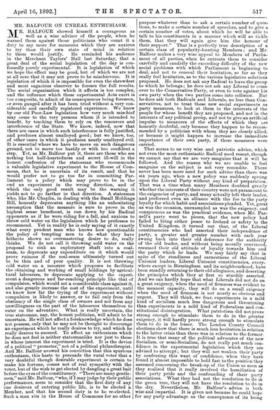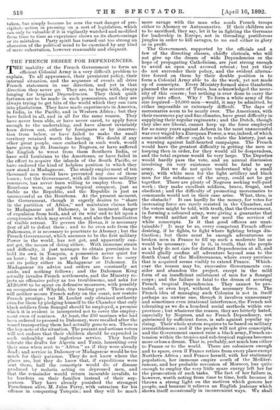MR. BALFOUR ON UNREAL ENTHUSIASM.
it/ER. BALFOUR showed himself a, courageous as well as a wise adviser of the people, when he warned them against those politicians who count it a duty to say more for measures which they are anxious to try than their own state of mind in relation to them would justify. He reminded, his audience in the Merchant Taylors' Hall last Saturday, that a great deal of the social legislation of the day is con- fessedly purely experimental. It is legislation of which we hope the effect may be good, but of which we are not at all sure that it may not prove to be mischievous. It is legislation of which it is impossible for even the shrewdest and most sagacious observer to foresee the full results. The social organisation which it affects is too complex, and the influence which these experimental Acts exert is too composite, to admit of its consequences being foreseen, or even gauged after it has been tried without a very con- siderable and, carefully registered experience. We know by our old Poor-Law legislation how very much mischief may come to the very persons whom it is intended to benefit, by teaching them to rely on the resources and interference of the State. We know, indeed, now that there are cases in which such interference is fully justified, and produces almost unalloyed good; but we know, too, of other cases in which it produces nearly unalloyed evil. It is essential where we have to move on such dangerous ground, not to move too hastily or with too confident a step. Yet, as Mr. Balfour put it, there are those who see nothing but half-heartedness and. secret ill-will in the honest confession of the statesman who recommends a, valuable legislative experiment to the House of Com- mons, that he is uncertain of its result, and that he would. prefer not to go too far in committing Par- liament to a policy which may prove to be in the end an experiment in the wrong direction, and of which the only good result may be the warning it yields not to go farther in that direction. A statesman who, like Mr. Chaplin, in dealing with the Small Holdings Bill, honestly deprecates anything like an unhesitating assumption that the measure is sure to prove in the highest sense beneficent, is run down by his Radical opponents as if he were riding for a fall, and anxious to throw cold water on the legislation which he professes to recommend. Yet in reality he is only saying of it exactly what every prudent man who knows how questionable the policy of tempting men to do what they have hitherto shown no overmastering desire to do, really thinks. We do not call it throwing cold water on the proposal to sink an exploratory shaft into a coal- seam, to deprecate any expenditure on it which would prove ruinous if the coal-seam ultimately turned out to be thin and of poor quality. It is not throwing cold water on a measure which proposes to facilitate the obtaining and working of small holdings by agricul- tural labourers, to deprecate applying to the experi- ment a dangerous and far-reaching principle like that of compulsion, which would set a considerable class against it, and also greatly increase the cost of the experiment, until we know how far the trying of the experiment without compulsion is likely to answer, or to fail only from the obstinacy of the single class of owners and not from any unwillingness on the part of the labourers themselves to enter on the adventure. What is really uncertain, the true statesman, nay, the honest politician, will admit to be uncertain. He will not affect a foreknowledge which he does not possess, only that he may not be thought to discourage an experiment which he really desires to try, and which he really desires to succeed. To affect an enthusiasm which he does not feel is neither statesmanlike nor just to those in whose interest the experiment is tried. It is the device of a political " promoter," not of a political philanthropist. And Mr. Balfour avowed his conviction that this spurious enthusiasm, this haste to persuade the rural voter that a very doubtful though desirable experiment is certain to make his fortune, comes not of real sympathy with the voter, but of the wish to get elected by dangling a great bait before the eyes of the constituency. "There are many gentle- men," said Mr. Balfour, "who, if I may judge by their public performances, seem to consider that the first duty of any one desirous of entering public life, is to be elected a Member, and that his second duty is to be re-elected. Such a man sits in the House of Commons for no other purpose whatever than to ask a certain number of ques- tions, to make a certain number of speeches, and to give a certain number of votes, about which he will be able to talk to his constituents in a manner which will so tickle them, that they will again give him the honour of their support." That is a perfectly true description of a certain class of popularity-hunting Members ; and Mr. Balfour makes a very wise appeal to Members of Parlia- ment of all parties, when he entreats them to consider carefully and candidly the exceeding difficulty of the new social problems with which Parliament is beginning to deal, and not to conceal their hesitation, so far as they really feel hesitation, as to the various legislative solutions proposed. He does not ask any Radical to leave the group to which he belongs ; he does not ask any Liberal to come over to the Conservative Party, or even to vote against his own party when the two parties come into collision. But he does ask both Radicals and Liberals, no less than Con- servatives, not to treat these new social experiments as party measures, to look at them in the interests of the people for whose benefit they are proposed, and not in the interests of any political group, and not to give an artificial impulse to measures of the effects of which they are honestly doubtful, only because they happen to be recom- mended by a politician with whom they are closely allied, or because it might happen to increase the immediate importance of their own party, if these measures were carried.
That seems to us very wise and patriotic advice, which not even the most enthusiastic Radical need. resent, though we cannot say that we are very sanguine that it will be followed. And the reason why we are unable to feel sanguine on the subject is not very recondite. There never has been more need for such advice than there was six years ago, when a new policy was suddenly sprung upon the Liberal Party without any kind of preparation. That was a time when many Members doubted greatly whether the interests of their country were not paramount to- the exigencies of party, and many actually left their leader, and preferred even an alliance with the foe to the party loyalty for which habit and associations pleaded. Yet, great as was the occasion, unexampled as was the exigency, and conspicuous as was the practical evidence, when Mr. Par- nell's party went to pieces, that the new policy had failed to bring either peace to Ireland or safety to the United Kingdom, it turned out that, of the Liberal constituencies who had asserted their independence of party, a greater and greater number with each year swung back into their old deference for the authority of the old leader, and without being morally convinced, resumed their old attitude of loyalty towards him and the party which he leads. We may fairly say that in spite of the steadiness and earnestness of the Liberal Unionist leaders, Liberal Unionist constituencies, every- where except in Birmingham and its neighbourhood, have been steadily returning to their old allegiance, and deserting the principles which they at first so sturdily asserted. And we can hardly hope that what Liberals did not do on a great exigency, when the need of firmness was evident to the meanest capacity, they will do on a small exigency when the need of firmness is not nearly so obvious and urgent. They will think, we fear, experiments in a mild kind of socialism much less dangerous and threatening than experiments in a mild kind of Federalism and con- stitutional disintegration. What patriotism did not prove strong enough to stimulate them to do in the greater exigency, it will hardly prove strong enough to stimulate them to do in the lesser. The London County Council elections show that there is much less hesitation in relation to the latter crisis than there was in relation to the former.
It is true that many of the political advocates of the new Socialism, or semi-Socialism, do not really put much con- fidence in the experimental legislation which they are advised to attempt; but they will not weaken their party by confessing this want of confidence, when they have found it almost impossible to hold fast to the position they assumed concerning the break-up of the Union so soon as they realised that it really involved the humiliation of their party pride and the confounding of their party associations. What they had not the resolution to do in the green tree, they will not have the resolution to do in the dry. Nevertheless, Mr. Balfour's advice is both wise and impartial. It is given not because he could hope for any party advantage as the consequence of its being taken, but simply because he sees the vast danger of pre- cipitate action in pressing on a sort of legislation, which can only be valuable if it is vigilantly watched and modified from time to time as experience shows us its shortcomings or its mistakes. Party spirit has turned out too strong an obsession of the political mind to be exorcised by any kind of mere exhortation, however reasonable and eloquent.

































 Previous page
Previous page